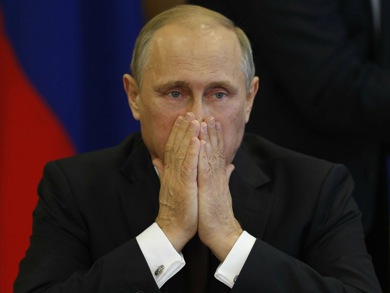Vladimir Putin is suddenly feeling the squeeze.
The Russian president, earlier this year a swashbuckling land-grabber who seemed to confound the West, finds himself in a three-way economic vise — tumbling oil prices, punishing sanctions and now a collapse in his country’s currency.
“He really is going to be hit by a perfect storm,” said Andrew Kuchins, director of the Russia program at the Center for Strategic & International Studies. “Although much of it is his own making.”
The value of the Russian ruble plunged by as much as 20 percent on Tuesday despite a desperate attempt by the central bank to strengthen the currency by jacking up interest rates. The ruble has lost half its value this year against the dollar.
Blame the two other crises that have sprung up on Putin.
One is the unexpected drop in the price of oil, the lifeblood of the Russian economy, to the lowest in five years. The Bank of Russia said Monday that if the decline holds, the Russian economy will shrink more than 4 percent next year — a severe recession.
“The things that bring all czars down are economic problems.”
The other is the economic pain caused by sanctions imposed on Russia by the United States and Europe earlier this year, after Putin grabbed the Crimean peninsula from Ukraine and was accused of stoking unrest in other parts of the country.
Putin has antagonized the West to promote his own popularity, and he remains firmly in charge. (Guess who just won Man of the Year in Russia for the 15th time in a row.) But the current economic crunch has some analysts saying that grip might loosen.
Putin’s powerful friends in the oligarchy have been hamstrung themselves by Western sanctions limiting their travel and access to world markets. Those same oligarchs, particularly in the energy industry, are now watching the value of their companies wither.
Meanwhile, the masses are restless: Two weeks ago, Putin froze salaries for Kremlin employees. Days before that, thousands of Russians marched in Moscow to protest the layoffs of thousands of doctors and plans to close hospitals.
And there were reports on Tuesday of Russians scrambling to buy expensive goods like cars and withdrawing their cash from banks to exchange it for dollars.
“The damage has been short-term so far, meaning it hasn’t translated into political unrest since people still have jobs, food, electricity,” said Matthew Rojansky, a Russia expert at the director of the Wilson Center’s Kennan Institute.
But if the economic mess continues for another year, it could translate into large-scale protests. And at that point all bets are off, Rojansky said.
“At that point, Putin will have the same stark choice eventually faced by most authoritarian leaders,” he said. “Make major concessions, even step down, or use massive violence against his own people.”
Russia in recent weeks has flown provocative routes into NATO airspace, and it’s possible that Putin, who relishes being unpredictable and staying on offense, could lash out further, Kuchins said.
But there are early signs that the squeeze may be forcing Putin to back down.
There was no shooting overnight in eastern Ukraine, and Ukrainian leaders have voiced optimism about upcoming peace talks. Secretary of State John Kerry on Tuesday cited “constructive choices” made by Russia, including the withdrawal of some personnel.
At the time same time, though, the prime minister of Russia published an opinion article on Monday threatening economic pain for Ukraine — “the ultimate price they will have to pay” — as that country deepens its integration with Europe.
And the White House is vowing new sanctions against a government-owned Russian arms dealer and other defense companies.
But the broader economic trouble presents the biggest risk for Putin, said Walter Isaacson, the president of the Aspen Institute, a policy studies institute in Washington. He suggested Putin might not make it to re-election in 2018.
“You can’t have growth with 17 percent interest rates. You can’t have a thriving economy with oil under $60 a barrel,” he told CNBC on Tuesday. “The things that bring all czars down are economic problems.”
CNBC


Leave a Reply
You must be logged in to post a comment.